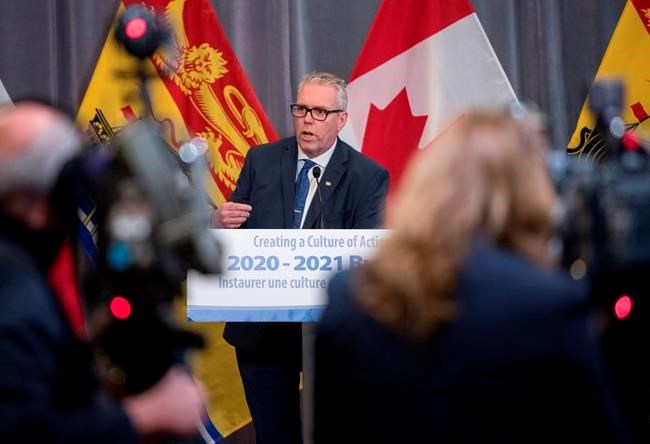FREDERICTON — New Brunswick's governing Progressive Conservatives tabled a $10.2-billion budget Tuesday that could prove to be their undoing, given their tenuous minority in the legislature.
Finance Minister Ernie Steeves presented the surplus budget as the Opposition Liberals promised to vote against it in a bid to topple the 17-month-old government led by Premier Blaine Higgs.
Liberal Leader Kevin Vickers said the Higgs government can't be trusted.
"Just a few weeks ago, the health-care system was in such shape that it needed cuts — and here they are today announcing a 3.9 per cent increase to the budget. How do you trust this?" Vickers said Tuesday.
He was referring to the government's aborted plan to close emergency rooms in six community hospitals at night as a way to deal with a shortage of staff. That plan was put on hold after a public backlash.
Vickers said he expects every member of the Liberal caucus to vote against the budget.
However, Liberal Gerry Lowe remains a wild card. Lowe has said his vote would hinge on how much the budget helps his Saint John riding.
Vickers said Lowe would face consequences if he fails to toe the line.
The current standings in the legislature are 20 Tories, 20 Liberals, three Greens, three People's Alliance members, one Independent and two vacancies.
Vickers said he could recall Liberal Daniel Guitard from his role as Speaker to secure one more vote for his party, as the Speaker doesn't vote unless there is a tie.
People's Alliance Leader Kris Austin said he and the party's two other caucus members will vote in favour of the budget.
"At the end of the day, I think it's going to be a hard budget to vote against," Austin said.
That means the Green party could cast the deciding vote on March 20.
"The balance of power has shifted in this legislature towards the Green caucus. We take that responsibility very seriously," said Green Leader David Coon.
"We are going to take our time to reflect on the budget, to discuss it, and in the end come up with a decision that reflects, in our view, what's in the best interests of our province."
Coon said the budget surplus of $92.4 million is larger than necessary, and he said more money should have been put into many of the budget initiatives.
Steeves defended the budget, saying it lowers the province's net debt by $129.3 million and puts money back in the pockets of New Brunswickers.
"This budget is designed to continue on our path to save New Brunswick, not to save government," Steeves said.
"By maintaining fiscal discipline, we can improve and deliver high-quality public services, reduce our debt and return some hard-earned dollars to New Brunswickers where it rightly belongs."
The net debt is expected to drop to $13.7 billion by the end of March 2021 — or about $17,611 for every man, woman and child in the province.
Servicing the debt is the sixth largest budget item.
Among the budget's highlights, health spending will increase to a record $2.9 billion, which includes new money for hiring nurse practitioners.
Steeves said $1.5 million will be added to the province's vaccination program, which will allow all New Brunswickers to have access to free flu shots.
Gas taxes are set to decrease by 4.63 cents per litre, effective April 1, as part of the New Brunswick carbon plan. The plan is contingent on legislation passing in the legislature prior to April 1.
Social assistance rates will increase for the first time since 2014. The rate for a single adult will increase to $564 per month from $537. As well, the rate will be indexed to the Consumer Price Index.
There will be no increase to the so-called sin tax on alcohol.
Taxes on commercial and residential rental properties will be reduced, but not until the 2021 tax year.
Paige MacPherson, Atlantic director of the Canadian Taxpayers Federation, said the change is good, but she would have preferred more tax relief.
"New Brunswickers pay some of the highest taxes in Canada, and while today's modest tax relief is good, the government should be eliminating the double property tax and dramatically dropping taxes on job creators to attract investment," said MacPherson.
Austin said he was also pleased with the tax changes.
"We'd like to see the elimination much sooner, but it's a step in the right direction," he said. "The reduction in the commercial tax is another thing we were looking for. Overall it's a good budget."
This report by The Canadian Press was first published March 10, 2020.
Kevin Bissett, The Canadian Press



